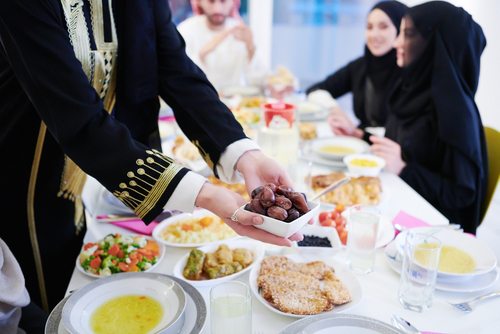How to Deal with a Fasting Coworker in Ramadan - Muslims spend the month of Ramadan to purify their souls and get closer to God during this holy time.

However, you shouldn't be concerned about offending your coworker because they appreciate it when their coworkers take an interest in Ramadan.
It's okay to inquire about something you don't understand. Muslims, on the other hand, enjoy discussing these matters.
When a Muslim employee is fasting during Ramadan, it's always appreciated if you acknowledge it.
Many inquiries are okay, but some statements and acts are best avoided when a coworker is fasting.
Here are eleven things you should never say or do to a fasting coworker, introduced by Dr. Job.
1- Do not force a colleague to join you for lunch.

Read also, 10 Tips to Fly Through A Workday In Ramadan
Some Muslims may also be reluctant to attend a required lunch gathering for the same reasons. Ask your coworker whether they like lunch meetings to be held at a different time and suggest rescheduling them.
2- Keep the dialogue focused.

That isn't because your Ramadan-fasting coworker or friend lost their sense of humor.
One may enjoy the maximum spiritual and psychological benefits of fasting by keeping a clear head throughout the month. That means that you should avoid any unpleasant speech at all costs.
3- If you're a manager, don't automatically assume that a coworker doesn't want accommodations.

You could, for example, allow employees who stay through lunch to leave an hour early or increase the number of work-from-home days available.
4- Do not inquire why a female coworker is not fasting.

Illness and travel are two more common excuses for Muslims not to observe a day of prayer and fasting.
Unless they bring it up voluntarily, it's best not to nudge a coworker who generally fasts but isn't.
5- During online meetings, put food and drinks away.

In the presence of fasting coworkers, it is advisable to refrain from eating and drinking.
Make careful to turn off your camera before you take a sip of coffee.
6- It's forbidden to smoke during Ramadan.

Fasting people are not allowed to smoke.
If you value the time you spend with your fasting friend, do not smoke in front of them.
7- Don't be scared to ask if you can join them for Iftar.

Many Muslim homes celebrate Eid al-Fitr after the month.
Iftar is an opportunity to learn more about your colleague's religion. Try to use Ramadan as a stage for increased understanding and enhancing team dynamics.
8- Don't get drawn into petty arguments.

When you fast, you aren't only abstaining from food from sunrise to sunset for a while.
Avoiding activities and behaviors that aren't spiritually uplifting is the goal.
As a statement of intent, "I'm fasting" is more of a polite excuse than a declaration.
People frequently say this phrase to break the conflict when a discussion gets out of hand.
That highlights the necessity of avoiding or preventing starting conflicts or tense confrontations.
Don't be offended if you're confronted with an "I'm fasting" response. It's merely saying, "I'm feeling a little annoyed."
9- Asking if a fasting coworker washed their teeth this morning is rude.

Many Muslim coworkers may choose to keep their distance or remain silent throughout the day.
Try not to call out the stench to them or others behind their backs in a critical manner if you encounter it when you are engaging with them.
10- Always accept an invitation to Iftar.

If you're asked to come over for Iftar, it's not the same as being invited for a nice lunch.
This desire to share the sacred moment when your first date is eaten and a glass of water taken at the end of a fasting day shows how cherished your connection is.
11- "Can't you even drink water?"








 2023-03-08
2023-03-08
 2022-11-11
2022-11-11
 2022-11-10
2022-11-10
 2022-11-05
2022-11-05
 2022-11-03
2022-11-03